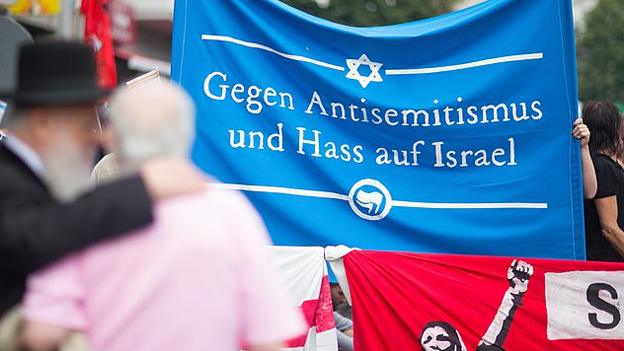UK anti-Semitism hit record level in 2014, report says
- Published
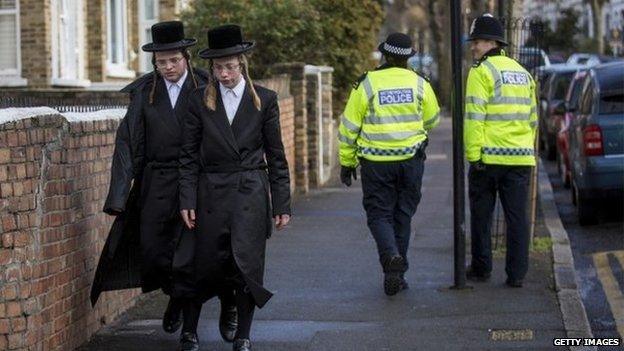
A far-right activist has threatened to protest against "Jewification" in Stamford Hill
Anti-Semitic incidents reached a record level in the UK last year, according to the Community Security Trust.
A report by the trust, which provides security for Britain's Jewish community and monitors anti-Semitism, said the number of incidents had more than doubled to 1,168 in 2014.
It is the highest figure since the trust began monitoring in 1984.
"Anti-Semitic reactions to the conflict in Israel and Gaza" were the biggest factor behind the rise, the trust said.
It recorded 314 incidents in July - the highest ever recorded in a single month.
It said almost half the offenders made reference to Gaza or Palestinians.
However, it said the number of incidents had already risen significantly in the first six months of the year, before the summer's conflict.
'Extreme' assault
The report said the increase was most marked in London - where the number of incidents rose by 137% to 583 - and in Greater Manchester, where the number rose by 79% to 309.
It said there were 81 violent anti-Semitic assaults across the UK in 2014.
One, in London last September, was classified as "extreme".
The victim was subjected to verbal abuse and was hit with a glass and a baseball bat, the report said.

Anti-Semitic graffiti was left on a toilet door in London in August 2014
Most assaults were random attacks on Jewish people in public places, it added.
It said 19 involved objects - usually eggs - being thrown at "visibly Jewish" people from cars.
Eight were assaults on synagogue congregants going to or from prayers, the report said, and four targeted Jewish schoolchildren on their way to or from school.
In addition, there were more than 300 reported incidents of verbal abuse - apparently randomly directed at Jewish people in public.
Hitler 'right'
For instance, in Manchester in November a 12-year-old girl was walking along the street when someone in a passing car shouted anti-Semitic abuse at her.
The report noted 233 cases of abuse or threats on social media last year, compared to 88 in 2013.
An image of Hitler, with the caption "Yes man, you were right" was widely shared over the summer.
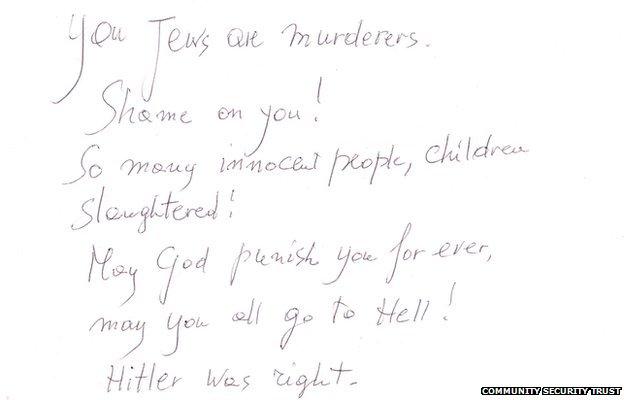
Some synagogues have received anti-Semitic messages, including this one received in north London
Social media is also being used to spread anti-Semitic messages, along with graffiti on the homes of Jewish people.
Several cemeteries have also been desecrated - including one in Manchester in February: "Jewish slag" was daubed on gravestones.
Attack drill
The report showed an increase in the number of incidents involving schools, Jewish schoolchildren or staff: 66 in 2014, compared with 32 the year before.
Children at one Jewish primary in north London told the BBC last month they had experienced anti-Semitism while travelling to school and on school trips.
They had also begun to practice what to do in case armed intruders attacked their school, external.
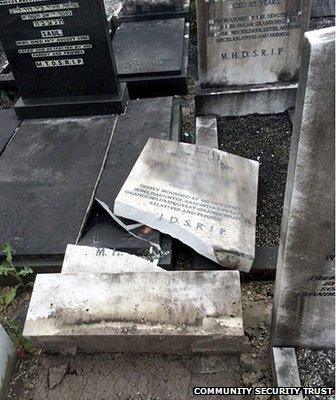
Jewish gravestones have been targeted
The most visible Jewish communities in Britain are the ultra-Orthodox, the Haredim: they wear traditional clothes, with men bearded and wearing skullcaps.
Britain's biggest Haredi community is in Stamford Hill, east London.
Last week one far-right activist said he was planning a protest there next month - against "Jewification", according to a poster he put on Facebook.
A leading figure in the Haredi community, Rabbi Avraham Pinter, said some in the community feared it might inflame tensions.
But he said they had been "overwhelmed" by support from all quarters, especially other faith groups.
Community 'anxious'
David Delew, chief executive of the trust, said the increase in recorded incidents "shows just how easily anti-Semitic attitudes can erupt into race hate abuse, threats and attacks".
Home Secretary Theresa May said the new figures were "deeply concerning", and she was committed to working with Jewish leaders and police to tackle anti-Semitism.
Shadow home secretary Yvette Cooper said this was "an important report" which "must serve as a warning to everyone".
The Metropolitan Police said hate crime "remains largely under reported" and urged victims to come forward.
In a statement, it said recent events had made Jewish communities "anxious" and said it was providing more patrols in "key areas" and was "closely monitoring the situation".
- Published19 January 2015
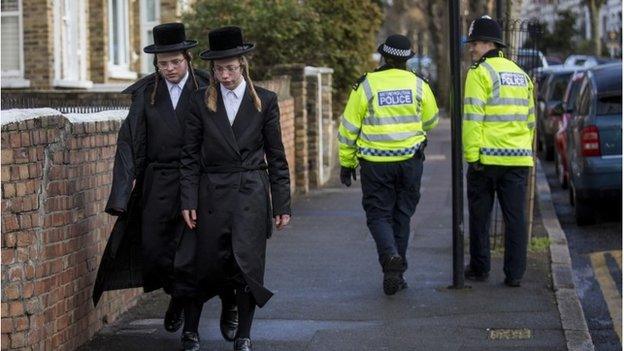
- Published19 January 2015
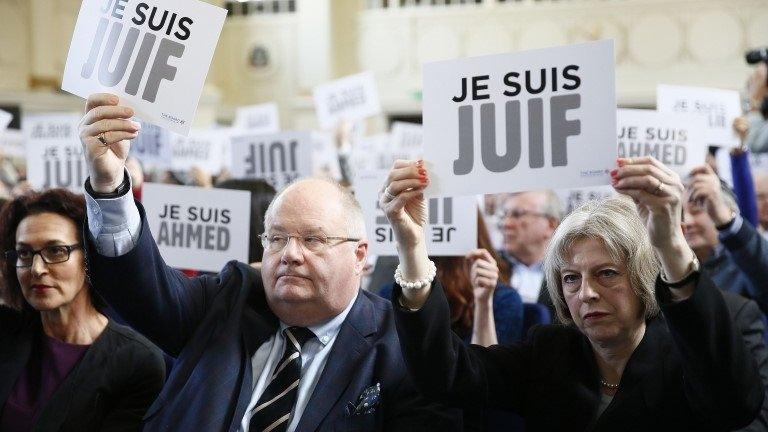
- Published21 August 2014
